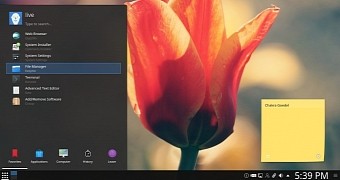Users of the Chakra GNU/Linux operating system can now install the latest KDE software, including KDE Plasma 5.13.4, KDE Applications 18.08, and KDE Frameworks 5.49 from the main repositories.
In early July 2018, Chakra GNU/Linux users have got their taste of the latest KDE Plasma 5.13 desktop environment, but now they can update their installations to the recently released KDE Plasma 5.13.4 point release, which brings more than 45 bug fixes and improvements. Additionally, users can now install the latest KDE Applications 18.08 and KDE Frameworks 5.49 software suites.
"On your next system upgrade you will receive all the latest versions of KDE’s Plasma, Applications, and Frameworks, in addition to the usual package updates," announced Neofytos Kolokotronis. "There is a new series 18.08 out for Applications, with improvements aimed at making your usability and productivity better, in addition to adding new features."
When updating their installations to the recently released KDE technologies mentioned in this article, Chakra GNU/Linux users should keep in mind that the Akonadi personal information management framework might require them to authenticate again in the accounts they've linked on their systems, according to Neofytos Kolokotronis.
Here's what else landed in the Chakra GNU/Linux repositories
Apart from the KDE Plasma 5.13.4, KDE Applications 18.08.0, and KDE Frameworks 5.49.0 updates, Chakra GNU/Linux users can now install some of the latest software releases, including Samba 4.8.4, CMake 3.12.0, Rust 1.28.0, OpenSSL 1.0.2p, TeX Live 2018.47465, Poppler 0.67.0, linux-firmware 20180730.7b5835f, as well as updated OTF and TTF fonts.
Being inspired by the famous Arch Linux operating system, Chakra GNU/Linux follows a rolling release model where users install once and receive updates forever. To update your Chakra GNU/Linux installations and enjoy all these updates and much more, open a terminal emulator and run the "sudo pacman -Syu" command, answering "yes" to any replacement question.

 14 DAY TRIAL //
14 DAY TRIAL //